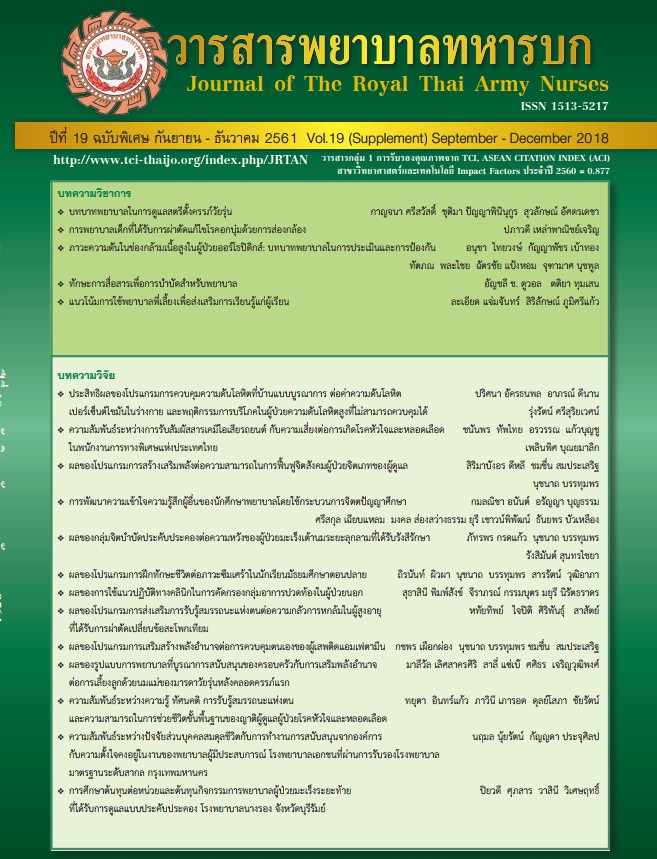The Effects of An Empowerment Program on The Psychosocial Rehabilitation Abilities of Caregivers of Schizophrenic Patients
Keywords:
empowerment, psychosocial rehabilitation ability, schizophrenic patientsAbstract
The present study was based on a quasi-experimental research design aimed at studying the effects of an empowerment program on the psychosocial rehabilitation abilities of caregivers of schizophrenic patients. The sample included 60primary caregivers of schizophrenic patients living in Huai Thap Than District, Sisaket Province,Thailand that met the inclusion criteria and that were randomized into experimentaland control groups, with 30 persons per group. The control group received routine caring activities. The research instruments were the following: 1) personal data; 2) an empowerment program; and 3) a psychosocial rehabilitation ability scale. The empowerment program was validated for content validity by 3 experts and the reliability of the psychosocial scalehad a Cronbach’s alpha coefficient of .98. Personal data were analyzed using descriptive statistics and hypothesis tested using dependent and independent t-test. The findings were as follows: 1) The psychosocial rehabilitation ability mean score of the caregivers after participating in the empowerment program (M = 102.50, SD = 6.06) was higher than before joining the program (M = 53.60, SD = 11.60), with a significant difference (t = 20.68, p< .001). 2) The mean difference between the pre-post psychosocial rehabilitation ability mean scores of the schizophrenic patients’ primary caregivers in the experimental group ( = 48.9, SD = 12.95) was significantly greater than that for the primary caregivers of the individuals that received regular caring activities ( = 0.64, SD = 3.05) (t = 19.87, p< .001). This study shows that an empowerment program of this type can enhance the psychosocial rehabilitation abilities of caregivers of schizophrenic patients and can be an alternative design for activities or programs to empower the caregivers of schizophrenic patient in terms of their psychosocial rehabilitation abilities.
Downloads
References
2. World Health Organization [WHO]. The World health report 2001: Mental health new understanding, new hope. 2016;
3. Norton, N., Williums, H.Y., & Owen, M.J. An update on the genetics of schizophrenia. Cunent Opinion in psychiatry. 2006; 19(1): 158-164.
4. Mental Health Department. Annual report department of mental health. information center planning division, Department of Mental Health, Ministry of Public Health, 2016. (in Thai).
5. Sukthong K., Uthis P., & Kertchok R. Effects of family group psychoeducation on burden and high expressed emotion in caregivers of schizophrenia patients in community. The Journal of Psychiatric Nursing and Mental Health. 2012; 26(3): 15-27. (in Thai).
6. Lim, C., Barrio, C., Hernandez, M., Barragán, A., & Brekke, J. S. Recovery from schizophrenia in community-based psychosocial rehabilitation settings.; 2017.
7. King, R., Lioyd, C., & Meehan, T. Handbook of Psychosocial Rehabilitation. Oxford: Blackwell; 2007.
8. Duangchan O., Khun Khok Choo P., & Kanjanicharangkul W. Social psychosocial practices in psychosocial clinics and kinematics of community hospitals.
Bangkok: Beyond .(in Thai).
9. Stanley S. & Shwetha,S.Integrated psychosocial intervention in schizophrenia: implications for patients and caregivers.International Journal of Psychosocial Rehabilitation. 2006; 10(2): 113-128.
10. Gibson, C. H. The process of empowerment in mothers of chronically ill children. Journal of Advanced Nursing.1995; 21(6): 1201-1210. doi: 10.1046/j.1365-2648.1995.21061201.
11. Neawbood S. Effects of empowerment program on self-care ability of a family caregiver. Journal of Nursing and Education. 2015; 8(4): 30-40. (in Thai).
12. Jaywan P., Nantachaipan P., & Thongchai C. Effects of the empowerment on perceived caring capabilities amonng caregivers of patients with traumatic brain injury. Nursing Journal. 2016; 43(1): 95-106. (in Thai).
13. Thanikkul B & Dangdomyouth P. The effects of self-help groups and empowerment of caregivers of schizophrenic patients in community. Journal of Psychiatry and Mental Health. 2012; 26 (2): 74-86. (in Thai).
14. Anantariyavej P., Jaiboon N., & Ploykluan W. The development of caregivers empowerment program of schizophrenia ptient with auditory hallucinations. The Journal of Psychiatric Nursing and Mental Health. 2013; 27(1): 97-107.
15. Panyasiri P., Sampalung J., Triripee S., & Chandaram W. Effect of empowerment program on caregiver capacity of vascular caregivers brain. Journal of Nursing, 2009; 36 (3): 47-57. (in Thai).
16. Boonmalic P. Development of life skills assessment for psychiatric rehabilitation [LSD 30]. Journal of Srithanya Hospital. 2012; (13): 3-29. (in Thai).
17. Leangpanich P., Somprasert C., & Imkome Ek. The effects of a peer support group program on psychosocial rehabilitation abilities in caregiver of schizophrenic patients. Journal of The Royal Thai Army Nurses. 2018; 19 (supplement): 214-223. (In Thai).
18. Chien, W., Norman, I., & Thompson, D. A randommized controlled trial of a mutual support group for family caregivers of patient with schizophrenia.
International Journal of Nursing Studies. 2004; 41(6): 637-649. doi:10.1016/j.ijnurstu. 2004.01.010
19. Saunders, JC. Families living with severe mental illness: a literature review. Issues in Mental Health Nursing. 2003; 24(2): 175-198. doi: 10.1080/01612840305301.
Downloads
Published
How to Cite
Issue
Section
License
บทความหรือข้อคิดเห็นใดใดที่ปรากฏในวารสารพยาบาลทหารบกเป็นวรรณกรรมของผู้เขียน ซึ่งบรรณาธิการหรือสมาคมพยาบาลทหารบก ไม่จำเป็นต้องเห็นด้วย
บทความที่ได้รับการตีพิมพ์เป็นลิขสิทธิ์ของวารสารพยาบาลทหารบก
The ideas and opinions expressed in the Journal of The Royal Thai Army Nurses are those of the authors and not necessarily those
of the editor or Royal Thai Army Nurses Association.






